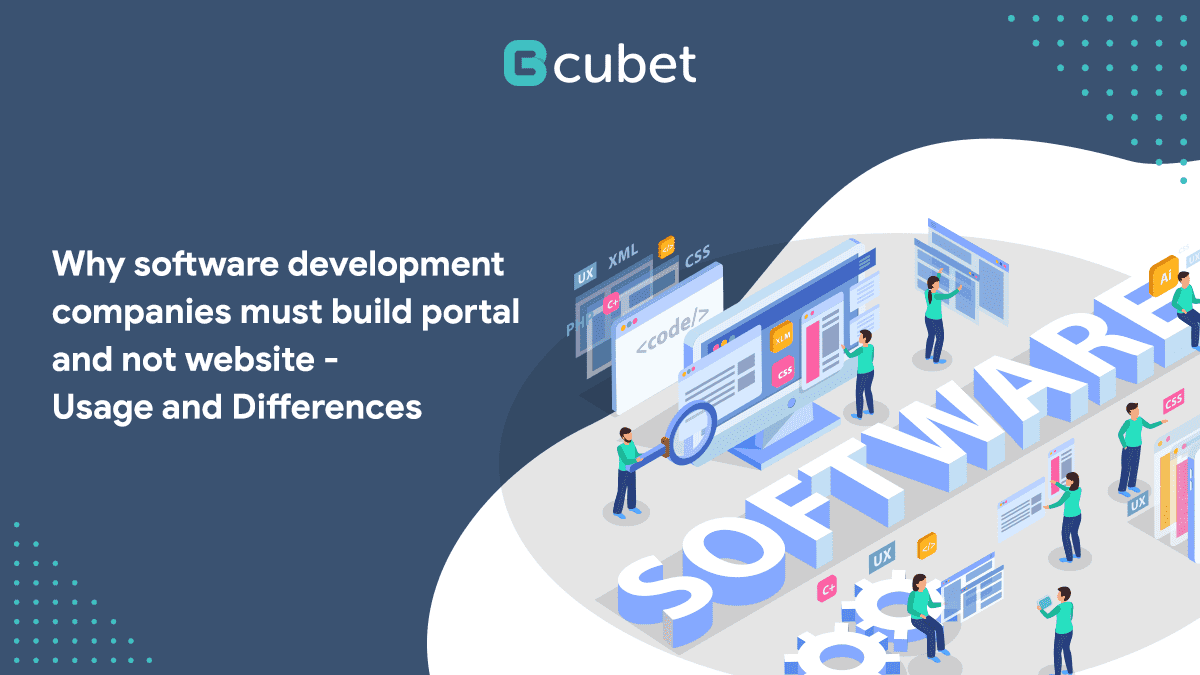Why Software Development Companies Must Build a Portal and Not a Website? – Usage and Differences

Web portal upgrades your website, improves relations, and is domain-specific. Websites and web portals can be differentiated in varied aspects. Websites majorly focus on driving traffic, and web portals limit the traffic.
Web portals require login while sites are open. Software development companies should use web portals for advanced user management and automation of the business process.
What is Web Portal Development?
Web portal development provides secure access to functionality and content on an easy-to-use interface. Websites are often confused with web portals, but the two have distinctive differences.
Users can interact with the data on the web portal, websites have read-only or static content, and there is no scope of interaction.
In addition, web portals require authentication and anonymous public pages. Plus, developing a web portal involves a series of steps like – planning, designing, integration, and tech support. A web application development company can help you develop both versions.
Why software development companies must build a web portal?
A web portal pulls information from a different location to organize it in a central location. Here, it can be accessed by all the users of the company. Besides, the information can be related, unrelated, or display categorized links and interactive elements.
Also, portals personalize the information of the users according to their needs. User groups will access different information from the group. Web portal facilitates the creation of secure, useful, and more personalized access points. Simply put, the process involves using advanced web development skills and practices that entail server-side and client-side scripting.
Web portal usage:-
A web portal works on three main categories:
- Integration – With integration, it serves to fill the pages uniting customers and systems.
- Consistency – refers to the unchanged look of the system components.
- Customization – is achieved by using personal accounts. The experiences can be customized in two ways – by tracking actions and observing biographical data.
Web portals provide an access point to content and services. Additionally, the information of the web portals is organized into different channels, which are customized page containers where the information is loaded. In short, they give access to create an integrated platform.
Difference between website and portal:-
- A web portal is for specific users, while a website focuses on driving many users.
- A web portal asks for login details from users, while a website offers free access to the site without login details.
- A web portal is privately accessible only for the portal members, whereas a website is publicly accessible.
- A web portal offers dynamic content, but it can change. A website offers static or dynamic content.
Benefits of Web Portal Development:-
1. Enhanced communication
Communication is the key to business ethics, and good communication keeps everyone on the same page. It helps to minimize misunderstandings and makes work efficient.
Managers and staff can share significant information like timely alerts and appointments -through web portals. Plus, companies can use portals to post and share ideas on discussion boards that allow different departments to share their thoughts. Besides, the portals are used by managers to recognize top performers.
2. Greater flexibility
When the reps need to respond to customer queries, they often need to switch to different applications to access information. The switching can waste considerable resources and time.
Plus, coping with the information can be time-consuming and increase the risk of manual error. And correcting the errors adds extra work for customer service. Developing a web portal can help to provide flexibility in this area.
3. Customization and seamless integration
Web portals provide a customized user experience that increases the success rate of the business. In addition, the users also look for customization for a streamlined experience while using a website.
Besides, slow loading costs the sites and business loss of revenue. However, customization and integration through plugins and tools can increase speed and enhance the user experience of the portal. Plus, it also leads to increased functionality.
4. Reduced distribution costs
Intranet portals can help you save on added business costs, especially print and distribution. And they help to publish and update a wide range of corporate documents like – guidelines, resources, protocols, and business procedures.
Companies can avoid ongoing printing and distribution costs – when managers and employees have a place to access the information easily. Plus, the information on these portals can be updated and maintained.
5. Tighter security
Data safety has become a major concern for businesses due to frequent hack attacks. Web portals are adept at providing a high level of security for the company’s data and files – allowing the customers and staff to use the website securely.
Also, it lessens the fear of cyber security incidents. Additionally, it helps to provide the users with excellent versatility. Most web portals can be accessed through desktops, tablets, smartphones, and laptops – giving access over multiple devices.
Conclusion
Are you looking for a private platform to target specific users? Then you can consider web portals. Web portals act as a business representation and can be scaled according to the needs of the business.
Besides, they focus more on satisfying the end-users and providing a positive experience. Web portal development services ensure the platform meets different business needs.